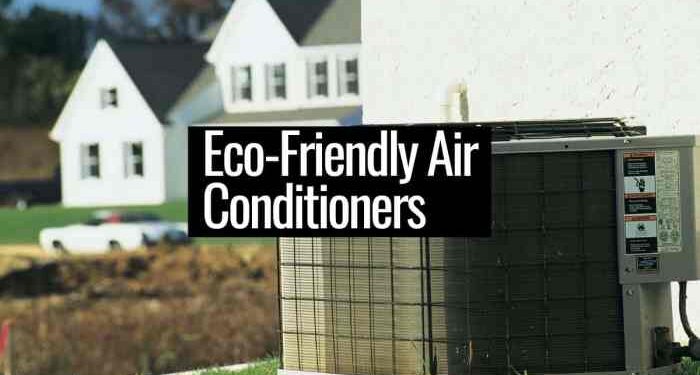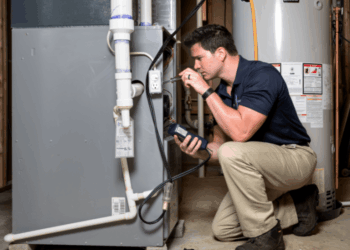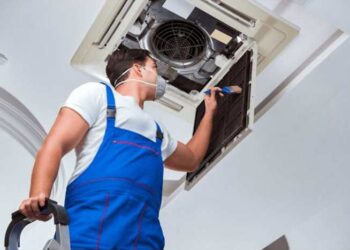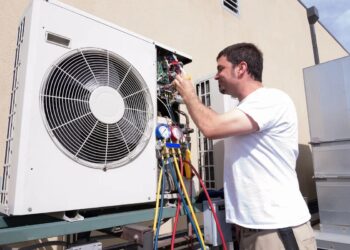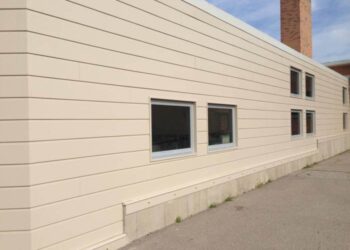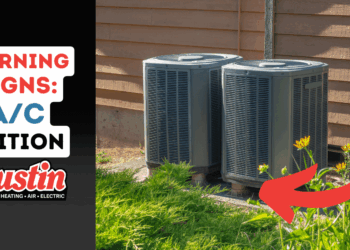Exploring the realm of Eco-Friendly Air Conditioner Replacement Options unveils a world of sustainable cooling solutions that not only benefit the environment but also your pocket. From energy-efficient technologies to eco-friendly refrigerant options, this guide delves into the innovative ways you can upgrade your air conditioning system while reducing your carbon footprint.
Eco-Friendly Air Conditioner Replacement Options
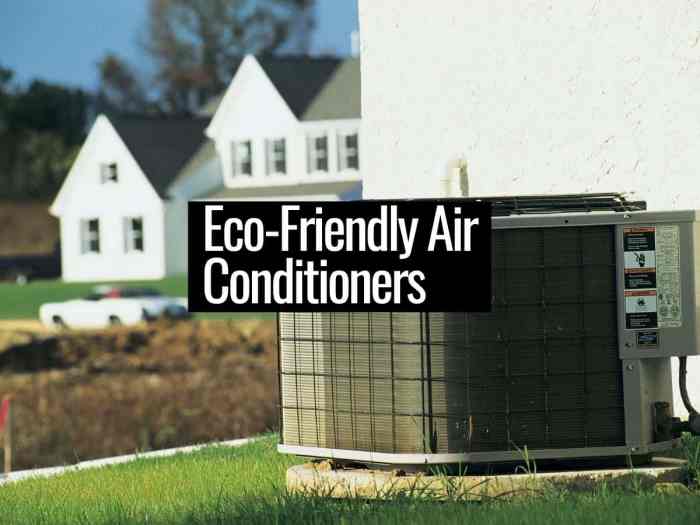
When it comes to air conditioner replacements, opting for eco-friendly options is crucial in reducing our carbon footprint and protecting the environment. Traditional air conditioners often use harmful refrigerants and consume a lot of energy, contributing to greenhouse gas emissions and climate change.
Importance of Eco-Friendly Replacements
Choosing eco-friendly air conditioner replacements can significantly reduce energy consumption and lower electricity bills. These alternatives are designed to be more energy-efficient, using advanced technologies that minimize environmental impact.
Benefits of Eco-Friendly Alternatives
- Lower Energy Consumption: Eco-friendly air conditioners are more energy-efficient, leading to reduced electricity usage and cost savings.
- Environmentally Safe Refrigerants: Unlike traditional air conditioners that use harmful refrigerants like HFCs, eco-friendly alternatives use safer options such as R-410A.
- Extended Lifespan: Eco-friendly air conditioners are often built with durable materials and advanced components, resulting in a longer lifespan and fewer replacements over time.
- Improved Indoor Air Quality: Some eco-friendly air conditioners come with advanced filtration systems that can help improve indoor air quality by reducing pollutants and allergens.
Environmental Impact of Conventional Air Conditioners
Conventional air conditioners release greenhouse gases and other pollutants into the atmosphere, contributing to global warming and air pollution. The refrigerants used in these systems can deplete the ozone layer and have a high global warming potential, further exacerbating climate change.
Energy-Efficient Technologies
When it comes to air conditioning, energy-efficient technologies play a crucial role in reducing energy consumption and lowering utility bills. Let's explore some of the options available:
Inverter ACs
Inverter air conditioners are designed to adjust the speed of the compressor motor to regulate the temperature. This results in less energy consumption compared to traditional AC units, as they do not constantly turn on and off to maintain the desired temperature.
Geothermal Heat Pumps
Geothermal heat pumps utilize the stable underground temperature to heat and cool homes efficiently. By transferring heat between the ground and the home, these systems can significantly reduce energy usage and provide consistent indoor comfort throughout the year.
Smart Thermostats
Smart thermostats are equipped with advanced features such as learning algorithms, remote access, and scheduling capabilities to optimize energy usage. By automatically adjusting temperature settings based on occupancy and preferences, smart thermostats help reduce energy waste and improve overall efficiency.
Refrigerant Options
When it comes to eco-friendly air conditioning systems, the choice of refrigerant plays a crucial role in determining the environmental impact of the system. Let's explore some of the refrigerant options available and their implications.
Eco-Friendly Refrigerants
- R-32: This refrigerant has a lower global warming potential compared to traditional refrigerants like R-410A. It is also more energy-efficient, making it a popular choice for eco-conscious consumers.
- R-410A: While R-410A is still widely used in air conditioning systems, it has a higher global warming potential than R-32. Efforts are being made to transition away from this refrigerant towards more sustainable options.
- R-290: Propane, or R-290, is a natural refrigerant with very low global warming potential. It is non-toxic and non-ozone depleting, making it an environmentally friendly choice for air conditioning systems.
Impact of Refrigerants
Refrigerants have a significant impact on global warming and ozone depletion. Traditional refrigerants like CFCs and HCFCs are known to deplete the ozone layer and contribute to the greenhouse effect. This has led to the phase-out of harmful refrigerants and the adoption of more sustainable alternatives.
Shift Towards Sustainable Options
The HVAC industry is gradually shifting towards more sustainable refrigerant options to reduce environmental impact. By phasing out harmful refrigerants and promoting eco-friendly alternatives like R-32 and R-290, the industry is taking steps towards a greener future
Sustainable Materials and Design
The use of sustainable materials and thoughtful design in eco-friendly air conditioners plays a crucial role in reducing the environmental impact of these cooling units.
Recycled and Biodegradable Components
- Many modern eco-friendly air conditioners incorporate recycled materials such as aluminum and copper for their coils and components. These materials help reduce the need for new mining and extraction processes, lowering the overall carbon footprint of the unit.
- Some AC units also feature biodegradable components, such as plastic made from plant-based materials or recycled plastics. These components break down more easily at the end of the unit's lifecycle, reducing waste in landfills.
Design Considerations for Environmental Impact
- Designing air conditioners with energy-efficient technologies and optimized airflow patterns can significantly reduce energy consumption, leading to lower carbon emissions during operation.
- Manufacturers are also focusing on creating air conditioners with modular designs that make it easier to repair and replace individual components, extending the lifespan of the unit and reducing overall waste.
- Proper disposal and recycling programs for old air conditioners ensure that harmful refrigerants and other components are handled responsibly, preventing environmental contamination.
Government Incentives and Rebates
Government incentives and rebates play a crucial role in encouraging homeowners and businesses to opt for eco-friendly air conditioner replacements. These programs aim to reduce the overall carbon footprint by promoting the adoption of sustainable HVAC solutions while also providing financial benefits to the consumers.
Available Incentives and Rebates
- Many local and state governments offer rebates to homeowners who upgrade to energy-efficient air conditioning systems. These rebates can help offset the initial cost of the new unit.
- Federal tax credits are also available for those who choose to install eco-friendly HVAC systems that meet certain energy efficiency criteria. This can lead to significant savings during tax season.
- Some utility companies provide incentives for customers who switch to energy-efficient cooling systems. These incentives can come in the form of cash rebates or reduced electricity rates.
Promoting Sustainable Solutions
- Government incentives and rebates help promote sustainable HVAC solutions by making them more accessible and affordable for consumers. This, in turn, encourages more people to make the switch to eco-friendly options.
- By offering financial benefits, these programs create a strong incentive for individuals and businesses to invest in energy-efficient air conditioning systems, ultimately leading to a reduction in greenhouse gas emissions and energy consumption.
Tips for Maximizing Benefits
- Research and take advantage of all available incentives and rebates in your area before purchasing a new air conditioner. This can help you maximize your savings and offset the cost of the upgrade.
- Ensure that the new system you choose meets the energy efficiency requirements to qualify for any available tax credits or rebates. This will help you make the most of the financial benefits offered.
- Consult with a professional HVAC contractor who is familiar with the incentive programs and can guide you through the process of selecting an eco-friendly air conditioning system that qualifies for rebates.
Wrap-Up
In conclusion, making the switch to eco-friendly air conditioner replacements is not just a choice for today, but an investment in a greener tomorrow. By embracing sustainable HVAC solutions and taking advantage of government incentives, you can enjoy a cooler home while contributing to a healthier planet.
Upgrade your cooling system, upgrade your lifestyle.
Questions and Answers
What are some benefits of opting for eco-friendly air conditioner replacements?
Choosing eco-friendly replacements not only reduces your carbon footprint but also leads to lower energy bills and a healthier indoor environment.
Which energy-efficient technologies are commonly used in air conditioning?
Inverter ACs, geothermal heat pumps, and smart thermostats are popular choices known for their energy-saving capabilities.
How do eco-friendly refrigerants impact global warming and ozone depletion?
Eco-friendly refrigerants like R-32 and R-290 have lower global warming potential and do not contribute to ozone depletion, unlike traditional refrigerants.

